|

songs | interviews | photos | tours | boots | press releases | timeline
Hi Folks! (Italy)
March/April 1992
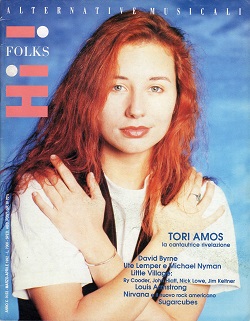
Note: [ . . . ] = text left out because it didn't include Tori quotes.
Tori Amos
ON THE COUCH, WITH TORI
by Ezio Guaitamacchi
A new, young, singer-songwriter on the horizon. She talks about love, sex, conflicts of adolescence, crucifixion, rape and the problems of women with great class, musical talents and a great deal of intensity. A revelation to listen carefully.
We meet in the lobby of the Hotel Diana in Milan. She has red hair and blue eyes, is small and fragile in appearance but very nice, dynamic and intense: a little earthquake.
[ . . . ]
"Quando mio nonno morì avevo 9 anni e fu il primo, vero dramma della mia vita" ricorda Tori con ancora un po' di magone "potessi farlo, passerei giornate intere sulla sua tomba."
"My grandfather died when I was 9 years old and that was the first real drama of my life," recalls Tori with a lump in her throat. "I could do that, I would spend whole days on his grave."
"Mia nonna invece" dice con rammarico "mi ha dato un sacco di problemi. Tutti dicevano che era una santa ma lei non faceva che predicare cose del tipo che una ragazza deve arrivare vergine al matrimonio altrimenti va all'inferno."
"My grandmother, however," she says with regret, "gave me a lot of problems Everyone said she was a saint but she did nothing but preach things like that a girl has to be a virgin at marriage otherwise she goes to hell."
[ . . . ]
"A scuola, gli altri bambini mi evitavano. Mi vedevano strana, diversa da loro. Io ci soffrivo."
"At school, the other children avoided me. I was seen as strange, different from them. I suffered there."
[ . . . ]
"Vinsi una borsa di studio per studiare al Peabody Institute, il pretigioso conservatorio di Baltimora. Ma io già ascoltavo e adoravo i Beatles, sentivo Jimi Hendrix, mi piacevano i Doors. Al conservatorio ritennero che non fossi idonea alla musica classica e mi cacciarono. Fu un episodio traumatico per me (avevo 11 anni), pensai di abbandonare tutto." Fu il padre che le diede coraggio e la portò in giro a suonare in piccoli club ("spesso locali per omosessuali, erano gli unici che mi ascoltavano con attenzione") dove avesse la possibilità di esprimere il suo naturale talento. Ritrovata un po' di fiducia, la piccola Amos iniziò una sua vita indipendente dalla famiglia. "Cominciai con cambiarmi il nome. Tori infatti non è il mio vero nome, è quello di un albero. Tutti mi chiamavano Ellen (il mio "middle-name") e a me non piaceva."
"I won a scholarship to study at the Peabody Institute, the pretigious Conservatory in Baltimore. But I already listened to and loved the Beatles, I was feeling Jimi Hendrix, I liked the Doors. The people at the Conservatory felt that I was not suited for classical music, and I was expelled. It was a traumatic episode for me (I was 11), I thought I'd give up everything." It was her father who gave her courage and took her around playing in small clubs ("often gay bars, they were the only ones that actually listened") where she had the opportunity to express her natural talent. Having found a little confidence, small Amos began a life independent of the family. "I began to change my name. Tori in fact is not my real name, it's a kind of tree. Everyone called me Ellen (my middle -name) and I did not like it."
[ . . . ]
"Dopo aver fatto del sesso con i ragazzi avevo tremendi sensi di colpa. Ero portata a credere che amore e lussuria non potessero convivere."
"After having sex with guys I had tremendous feelings of guilt. I was led to believe that love and lust could not go together."
[ . . . ]
"Sono stata anche da un'analista ma solo perchè le mie condizioni fisiche erano davvero pessime."
"I went to an analyst, but only because my physical condition was so bad."
[ . . . ]
"Sapevi" le chiedo "che anche James Taylor, nativo come te della Carolina, si era recato a Londra per incidere il suo primo album?" "Davvero?" mi guarda stupefatta "che combinazione incredible. Sai all'inizio mi piaceva tanto stare a L.A. .... mi sembrava di essere una bambina all'interno di un negozio di caramelle .... ma dopo un po' ho incominciato a capire che quella città è molto spersonalizzata, è enorme, ti stanca .... e ti può portare alla noia. Cominciavo ad essere un po' stressata anche dell'ambiente del business musicale, non lo sentivo come parte di me stessa. Ad un certo punto mi sono detta: devo andarmene.
"Did you know," I ask her, "that James Taylor, a native of Carolina like you, had gone to London to record his first album?" "For real?" she looks at me astonished, "what a coincidence. You know, in the beginning I really liked it in L.A. .... I felt like a kid in a candy store. But after a while I began to understand that that city is very depersonalized, it's huge, you get tired of it. And it can lead to boredom. I began to be a bit stressed, also the environment of the music business, I did not feel like part of myself. At one point I said to myself: I must go."
E' stata una decisione difficile perchè il mio ragazzo, Eric Rosse, ancora adesso sta a Los Angeles ma io ho preso l'occasione che la casa discografica mi offriva per poter continuare a comunicare con il mondo attraverso la mia musica. E' una cosa che difficilmente il sistema americano, con il suo approccio massificato, ti consente di fare. E io mi sento di dire le cose che ho dentro, di suonarle e cantarle davanti alla gente: di poter insomma vivere la mia vita come meglio credo. Ho 29 anni ed è tempo per me di fare passi importanti: passerà probabilmente del tempo prima di un altro album, prima di aver di nuova della cose da dire. Quello che esprimo viene dal mio cuore, dalle mie esperienze reali, dalle mie emozioni, dalle mie sensazioni più intime. Queste cose non le puoi inventare, non le puoi riprodurre meccanicamente. Non sono un'artista che fa un "songolo" e stop, che rincorre le classifiche sull'onda di una moda."
"It was a difficult decision because my boyfriend, Eric Rosse, he is still in Los Angeles, but I took a chance that the record company offered me to continue to communicate with the world through my music. It's something that is unlikely that the American system, with its massed approach, allows you to do. And I would say the things that I have inside, to play them and sing in front of people: in short, to be able to live my life as best I think. I'm 29, and it is time for me to make important steps. It will probably be some time before another album, before I have new things to say. I express what comes from my heart, from my real experiences, from my emotions, my most intimate feelings. These things can not be invented, you can not play mechanically. I'm not an artist who does a 'hit single' and starts chasing the charts in the wake of a fashion."
Tori ti travolge. E' come un fiume in piena, la sua comunicazione è diretta e mi confessa "sai, ho scritto un pezzo che si chiama "Sugar" che riguarda proprio gli incontri che ciascuno di noi ha, per diversi motivi, quasi quotidianamente con le persone più diverse. Mi capita sovente, se mi piace una persona, che anche durante un breve colloquio riesco ad instaurare un feelin così intenso che sfiora il rapporto fisico."
Tori overwhelms you. She's like a river in flood, her communication is direct and she tells me, "You know, I wrote a piece called "Sugar" that's about the meetings each of us has, for several reasons, almost every day with different people. It happens often, if I like a person, that even during a short interview I can establish a feeling so intense that touches the physical relationship.
Riporto il discorso sulla sua nuova vita londinese.
We carry forward the discourse on her new life in London.
"All'inizio è stato difficile. Per circa 4 mesi non ho potuto suonare, ero sola, solissima. Ma ormai il passo era stato fatto, la casa discografica voleva che io cominciassi a fare degli show perchè, dicevano, "la gente ti deve vedere, sentire, ascoltare con attenzione." Così ho cominciato a vivere nuovamente. Sai, è strano ho conosciuto gente che voleva lasciare Londra e andare a Los Angeles .... per ognuno di noi è diverso. Per me ha voluto dire un cambio di vita, una nuova cultura, gente diversa e anche il mio approcio alla vita è cambiato. Mi sono sentita libera, indipendente, sicura del fatto mio."
"Ma" obbietto con un pizzico di polemica "ti piacciono davvero i "maledetti inglesi?"
"At first it was difficult. For about four months I could not play, I was alone, super lonely. But now the pace had been done, the record company wanted me to begin to do shows because, they said, 'People will have to see, hear, listen carefully.' So I started to live again. You know, it's weird, I met people who wanted to leave London and go to Los Angeles .... to each of us it's different. For me it meant a change of life, a new culture, different people and my approach to life has changed. I felt free, independent, sure of myself."
"But," I object with a hint of controversy, "Do you really like the 'bloody English?'"
"Ti dirò la verità: gli adoro. Sono così strani, chiusi, magari snob .... ma sono unici. Ho molti amici e soprattutto delle ottime amiche."
"I'll tell you the truth: I love them. They are so strange, closed, maybe snobby .... but they are unique. I have many friends and especially good friends."
Ascoltando le canzoni di Tori Amos è abbastanza ovvio fare dei riferimenti a Joni Mitchell o a Kate Bush: alla prima per il tipo di scrittura musicale e per la capacità di comunicare sentimenti ed emozioni del proprio mondo interiore, alla seconda per il timbro vocale e il modo di cantare.
Listening to the songs of Tori Amos is quite obvious do references to Joni Mitchell or Kate Bush: the first for the type of musical writing and for the ability to communicate feelings and emotions of their inner world, the second for the vocal timbre and the way of singing.
"Blue" di Joni Mitchell" ammette Tori "è ancora oggi uno degli album più belli che io abbia mai sentito, ma mi sona sempre piaciuti anche i Beatles e trovavo irresistibile l'energia di Jim Morrison: ero attratta dal suo lato oscuro. Sai, alla fine degli anni '70, io vivevo una crisi profonda .... avevo come una doppia identità il mio lato buono e il mio lato cattivo, brava ragazza oppure sgualdrina, insomma era un vero casino ... non sapevo cosa fosse giusto e cosa fosse sbagliato .... un sacco di sensi di colpa. Sai credo che David Lynch, nei suoi film, abbia esplorato molto bene i lati oscuri che ci sono in ognuno di noi. Forse lui è stato la mia maggiore influenza dal punto di vista compositivo. Le sue storie, così come le mie canzoni, ti portano via, come in un viaggio immaginario ... ecco forse questa è la giusta chiave di lettura."
"'Blue' by Joni Mitchell," admits Tori, "is still one of the best albums I have ever heard, but personally I always liked the Beatles and the irresistible energy of Jim Morrison: I was attracted by his dark side. You know, at the end of the 70s , I lived a deep crisis .... I had a dual identity as my good side and the bad side of me, good girl or slut, it was a real mess ... I did not know what was right and what was wrong .... a lot of feelings of guilt. You know that David Lynch, in his films, has explored the dark side very well, and that's there in all of us. Maybe he was my greatest influence in terms of composition. His stories, like my songs, take you away, as in an imaginary journey ... here perhaps this is the right interpretation."
Le chiedo "quando hai iniziato a scrivere le canzoni di questo album?"
I ask "When did you start writing songs for this album?"
"Sono state scritte tutte negli ultimi quatro anni. E tutte mi rappresentano ancora molto bene perchè quando sei sincera, quando parli di te stessa onestamente, in qualunque momento della tua vita, quello rimarrà per sempre. Ci sono dei pezzi che ho scritto quando avevo dieci anni e che ancora oggi mi appartengono.
"They were all written over the past four years. And all of them are still very good because when you're honest, when you talk to yourself honestly at any time of your life, that will remain forever. There are pieces that I wrote when I was ten and still belong to me."
C'è stato un periodo (avevo circa 18/19 anni) quando per vivere suonavo nei club il repertorio di altri artisti e non era facile. Mi sentivo finta. Quando ho deciso di tornare e suonare al pianoforte le mie composizioni, così come facevo da piccola, è come se il cerchio si fosse chiuso: un ritorno alle mie radici artistiche, alla mia vera forma di espressione. Ho così ridato vita al bambino che c'è in me, alla mia più genuina e spontanea maniera di essere."
"There was a time (I was about 18/19 years old) when I was playing in clubs to live, the repertoire of other artists, and it was not easy. I felt fake. When I decided to come back to the piano and play my compositions, like I did as a child, it's as if the circle was closed: a return to my artistic roots, to my true form of expression. So I revived the child in me, to my most genuine and spontaneous way of being.
[transcribed and translated by jason/yessaid]
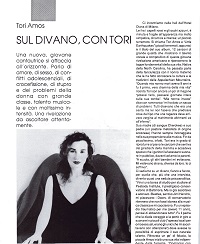 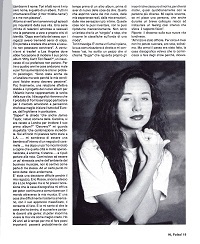
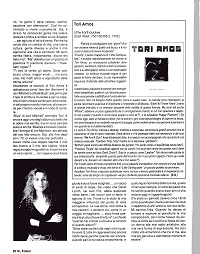 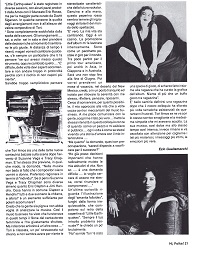
[scans by Sakre Heinze]
t o r i p h o r i a
tori amos digital archive
yessaid.com
|